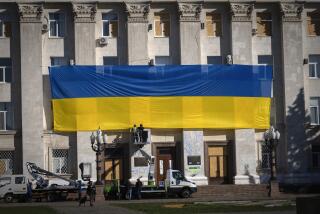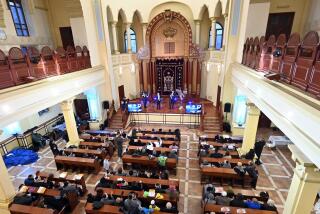In Chechnya, a new ski resort can’t overshadow accusations of human rights abuses
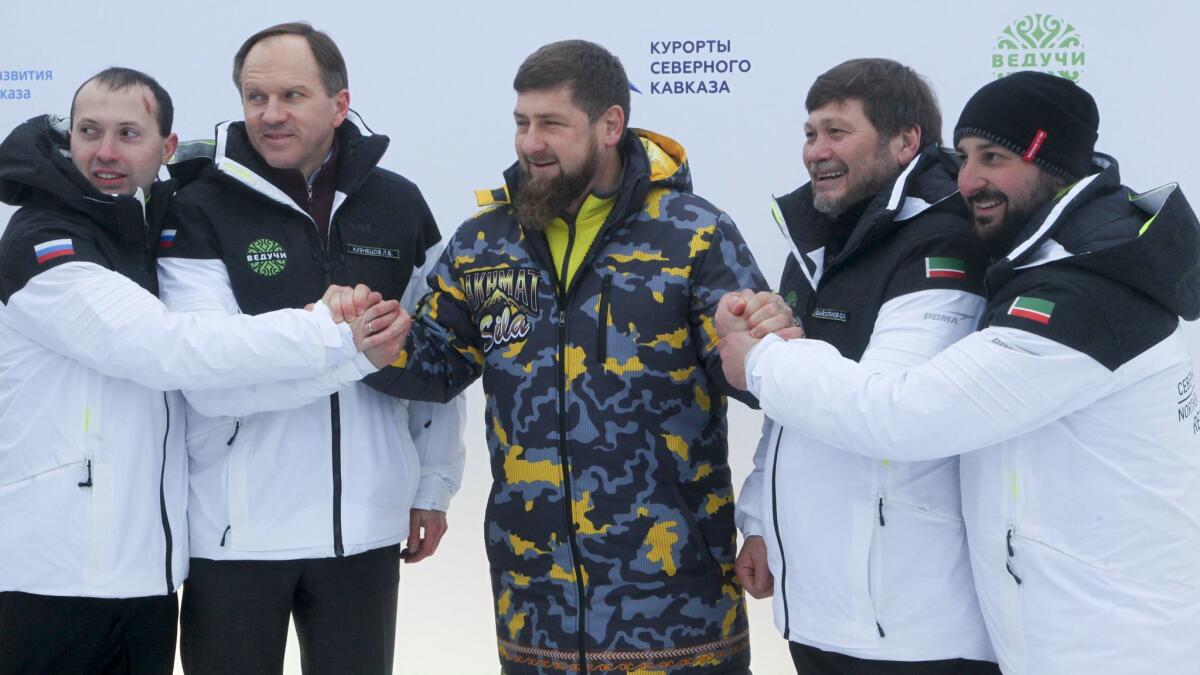
Reporting from VEDUCHI, Russia — It was a triumphant day for Chechnya and its leader — the grand opening of a glitzy $115-million ski resort in the mountains that were the scene of two brutal wars with Russia since the 1991 breakup of the Soviet Union.
The head of the Russian territory, Ramzan Kadyrov, wearing a colorful, camouflage-patterned snowsuit, walked a red carpet to the applause of about 500 Chechen government officials, Kremlin representatives, well-connected locals and other VIP guests.
“Veduchi is a world-class project, and I believe it will be popular not just with Russians but also foreigners,” Kadyrov told the crowds before riding a ski lift up the mountain and then back down.
Neither Chechnya nor Kadyrov are known for skiing, and one of the reporters there was interested in another topic: What was his response to accusations by a Russian media outlet that Kadyrov’s security forces had systematically rounded up members of the LGBT community and tortured or killed them?
“So-called human rights activists make up all sorts of nonsense for money,” said Kadyrov — who has vehemently denied the allegations — before being whisked away by his bodyguards.
It was an uncomfortable reminder that all is not well in the republic.
Nearly a decade out of war, Chechnya and the Kremlin want to show the world that the republic in the North Caucasus is thriving. But human rights groups say that behind the facade of Chechnya’s revitalization is an authoritative government that rules by fear.
“It’s the harshest dictatorial regime we have in Europe at the moment,” said Ekaterina Sokirianskaya, the director of the Conflict Analysis and Prevention Center, a think tank based in Istanbul, Turkey. “There is nothing that even comes close to comparison.”
And it’s getting worse as Kadyrov tightens his grip, with Chechens increasingly afraid to talk about human rights abuses they witness, or say anything bad about the republic, she said.
“It’s very heartbreaking. This nation has lived through two devastating wars and is now faced with such an acute repression and humiliation,” she said. “People are forced to not just tolerate, but actively support and praise the regime. Young people are growing up in an environment when they have to pretend and lie to be able to function.”
Kadyrov’s decade in power has been marked by a steady stream of extrajudicial killings and abductions of his enemies or people he considers undesirable, according to human rights groups.
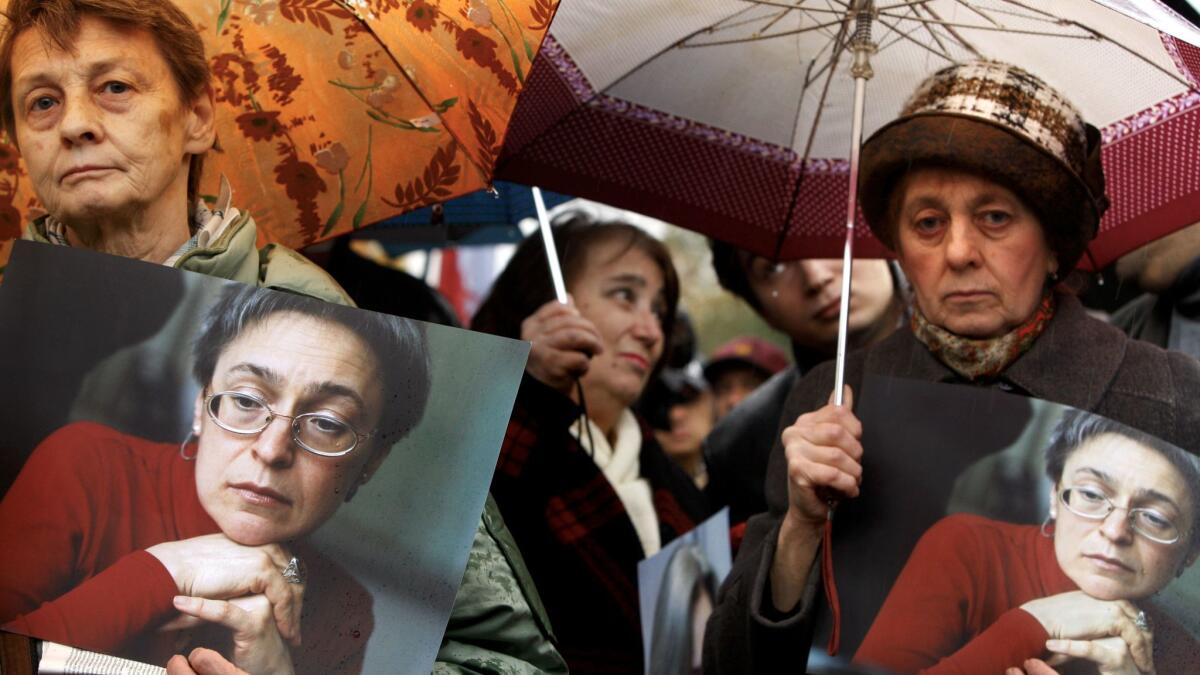
A U.S. State Department spokesman said in December that there was evidence that “one or more of Kadyrov’s political opponents were killed at his direction.” Human rights groups claim Kadyrov ordered the 2006 murder of Russian journalist Anna Politkovskaya, who frequently reported on the Kremlin’s relationship with Kadyrov. He denies the allegations.
The Russian newspaper Novaya Gazeta, which exposed the “anti-gay purge,” estimated that dozens of men had been rounded up and tortured by Kadyrov’s security services. Human Rights Watch corroborated the story, saying that about 100 Chechen men were seeking asylum because of the purge.
In the most recent crackdown, Chechen police last month arrested Oyub Titiyev, who works for the human rights group Memorial, heading its office in the capital, Grozny, and charged him with possession of marijuana. If convicted, Titiyev faces 10 years in jail. Titiyev’s defenders say he is a devout, teetotaler Muslim and accuse the police of planting the drugs in his car.
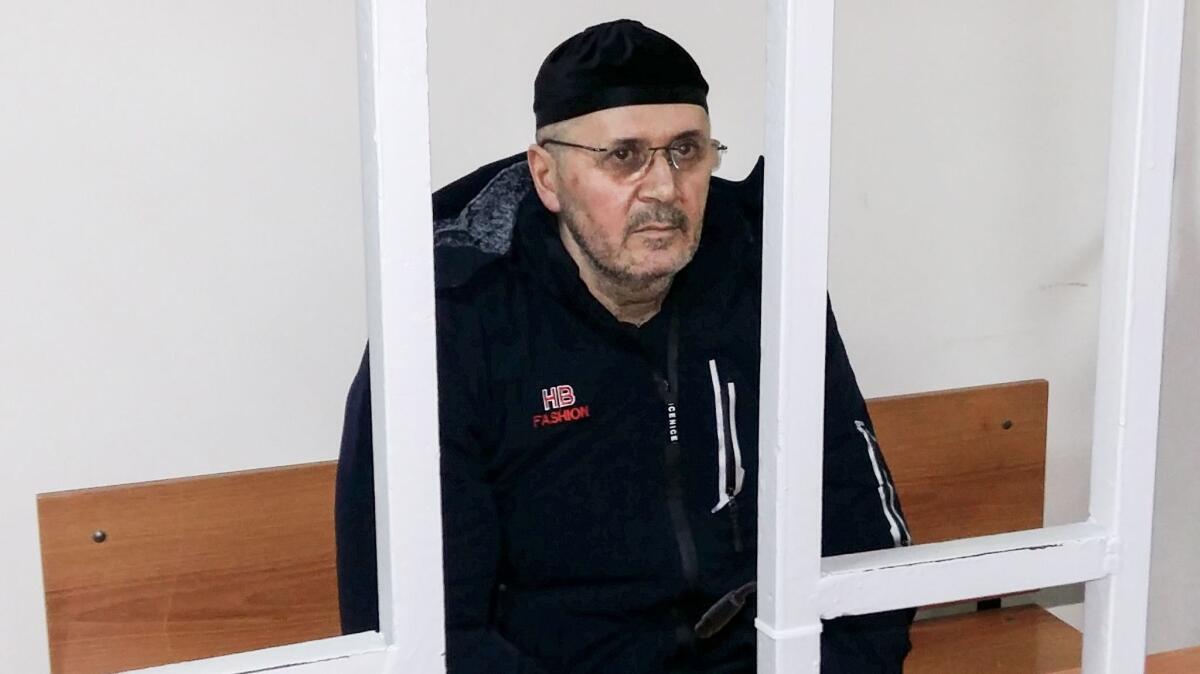
Days after Titiyev’s arrest, arsonists torched Memorial’s regional office in neighboring Ingushetia, also a Russian republic. Then Memorial’s car was burned in Dagestan, another Russian republic in the North Caucasus.
“Chechen authorities are on an all-out campaign to force Memorial out,” Human Right Watch’s Rachel Denber, the deputy director of the group’s Europe and Central Asia division, said in a news release last month.
The group’s troubles with Chechen authorities date to at least 2009, when Natalya Estemirova, a Memorial board member working to expose abuses, was abducted after leaving her Grozny home and later found shot to death in a wooded area.
Last year, the United States imposed sanctions on Kadyrov under the Magnitsky Act, a law that puts financial and travel restrictions on human rights violators.
The sanctions also prompted Facebook and Instagram to close Kadyrov’s accounts, which he had used to promote his love of sports and country and post thinly veiled threats against human rights workers, who he says have no place in Chechnya or Russia.
The Kremlin has brushed off the accusations against Kadyrov. Dmitry Peskov, a spokesman for Russian President Vladimir Putin, called the U.S. sanctions against the Chechen leader “illegal” and “unfriendly.” A spokeswoman for the Russian Foreign Ministry said they were “grotesque” and baseless.
Kadyrov, 41, was once Russia’s enemy, fighting alongside his father, Akhmad Kadyrov, in the 1994-96 Chechen war for independence. When war broke out again in 1999, the Kadyrov clan switched allegiances and backed the newly elected Putin and the Russian forces. Kadyrov quashed other insurgent groups and solidified the family’s control of the republic.
At least 160,000 people died in the two wars — although the actual number may be double that — and tens of thousands more were displaced.
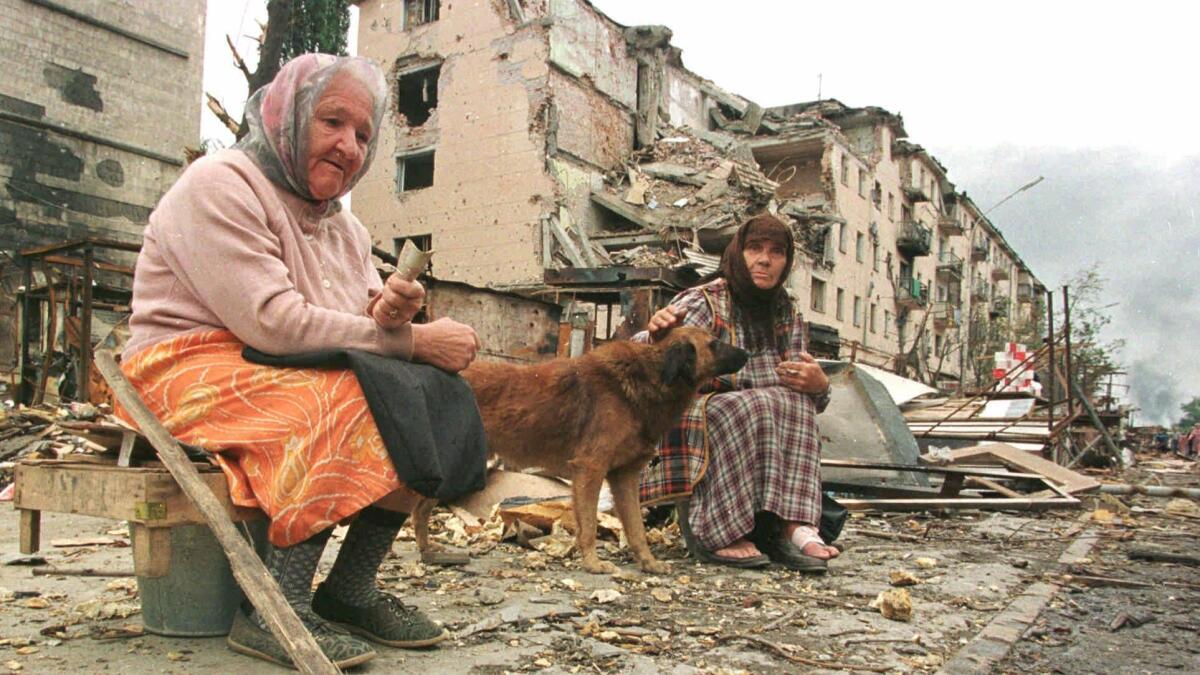
In 2004, Akhmad Kadyrov was killed in a bombing in a Grozny stadium. His son, Ramzan, became acting prime minster until 2007, when Putin appointed him president of the Chechen republic.
Ramzan Kadyrov has called Putin his “idol” and said he was prepared to die for the Russian president. In a symbol of his loyalty, he changed his title from president to the “head” of the republic, because he has said there can only be one president in Russia.
Having a strongman in the North Caucasus has served Putin well. Not only has Kadyrov quashed domestic insurgents, but he has also provided both political and military support for Russia’s objectives in Syria. Chechen troops serve as military police there, and Kadyrov has met with Syrian leadership in Damascus and used his charitable foundation to rebuild a mosque in war-ravaged Aleppo.
He has also traveled to Saudi Arabia to discuss cooperation in counter-terrorism efforts.
In exchange for Kadyrov’s loyalty, the Kremlin has spent billions of dollars rebuilding the Chechen republic.
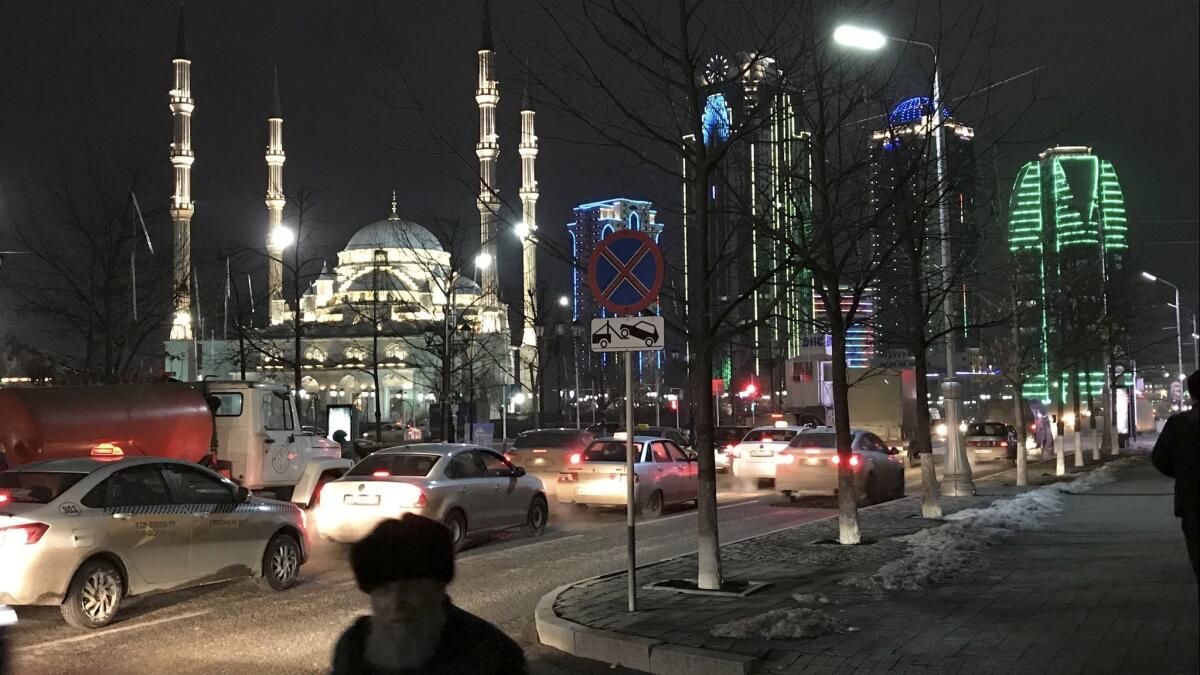
Grozny, nearly flattened in the wars, now features Dubai-style skyscrapers, a main drag named after Putin, and a massive, Ottoman-style mosque.
The state-owned tourist company said that 100,000 people visited the republic last year, up from 90,000 in 2016. Most are Russians who arrive in Grozny on tour buses from nearby North Caucasus cities.
The ski resort is Chechnya’s latest marvel.
“It’s a shame that we lost 25 years waiting for this sort of thing to happen here,” said Ibrahim Arsanov, the director of a private foreign-language school in Grozny who traveled 50 miles through twisting mountain roads from the republic’s capital for the opening ceremony last month. “Of course people will come. It’s great for us.”
Eventually it will have 17 runs, seven lifts and hotels to accommodate 4,800 guests. But at the opening ceremony last month, it didn’t even have enough snow.
Truckloads had to be brought in and dumped on the ski runs. A heavy fog covered the mountaintop.
Maryam Isabaera, 21, a university student in Grozny, was one of several volunteer hosts for the festivities. They were quick to point out what they considered the positive attributes of the republic, including growing economic opportunities.
“We only got out of a war less than 20 years ago, we are still growing,” Isabaera said in English. “Everything is still in the process here, but I think it is getting better all the time for young people.”
Pressed about accusations of human rights abuses, Isabaera and three other volunteers dressed in bright green jackets bearing the Veduchi logo said they hadn’t heard of anything like that happening in Chechnya.
As the hosts walked away, a young, bearded man approached a Western reporter and said in Russian: “You know that we will never tell you the truth about what is happening here, don’t you?”
“If we did, they will come and find us at work and harass us,” the man said. “What I can tell you is that everything you read about on the internet, all the accusations of torture and burning people’s houses, it’s all true.”
Twitter: @sabraayres
Ayres is a special correspondent.
More to Read
Sign up for Essential California
The most important California stories and recommendations in your inbox every morning.
You may occasionally receive promotional content from the Los Angeles Times.

